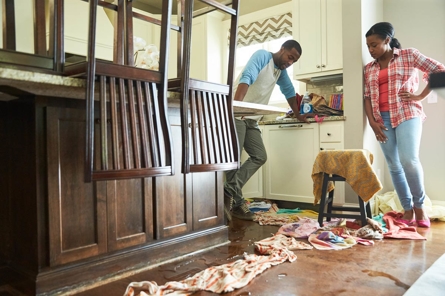
Table of Contents
Water damage can happen at any time. From plumbing leaks to faulty or broken appliances, water overflow can cause severe damage, especially if it’s not taken care of immediately.
To reduce common risks like mold growth, foundational issues, and flooding caused by water damage, use these tips from ServiceMaster Restore to maintain your fixtures and appliances effectively.
Broken and Leaking Pipes: Causes and Prevention Tips
Leaking or broken water pipes are among the most common causes of water damage to a home.
If a pipe ruptures in your home, severe water damage can occur. Sometimes, all it takes is a change in water pressure or freezing temperatures to cause pipes to burst. Even a minor dripping leak can lead to substantial water damage over time.
However, not all water damage is visible. Plumbing or drain damage can often go unnoticed within your home's walls or in areas that are not highly trafficked.
How to Help Prevent Water Damage from Leaking Pipes
Here are a few tips to help prevent severe water damage from leaking pipes:
- Shut off Your Water. If a pipe bursts or you have a significant leak, shut off the main water supply.
- Inspect Your Home. Look for leaks under cabinets, around toilets, and in the basement. If you find a leak, call a plumber, and if the water damage is severe, contact a restoration company.
- Know the Signs of Water Damage. Listen at night for sounds of dripping water and look for discolored walls.
Water Overflow: Causes and Prevention Tips
Forgetting to turn off the sink or tub faucet can lead to a soggy problem.
If ignored long enough, water overflow caused by sinks or toilets can wreck flooring and carpeting and even break through a downstairs ceiling. If not thoroughly cleaned up and restored immediately, you may also experience permanently damaged wood and mold growth.
How to Help Prevent Water Overflow
Here are several ways to prevent water overflow itself and severe damage from overflows:
- Always keep an eye on running faucets.
- Know how to turn off the water supply on each toilet and sink.
- If you're unable to reach your faucet or the taps won't close, turn off the main water supply lines to your home.
- Acting quickly is key to avoiding costly damage to your home and belongings.
Appliance Leaks: Causes and Prevention Tips
Leaky appliances can lead to severe water damage.
A dishwasher leak, for instance, can damage cabinetry with water and lead to warped wood or mold growth. Refrigerators may have a clogged pipe or a leaking defrost pan that needs to be addressed.
Likewise, washing machines and water heaters can wear out and leak unless regularly maintained. AC drain lines can also get clogged, causing the drain pan to overflow and cause severe water damage.
How to Help Prevent Appliance Leaks
- Check water supply lines every year.
- Replace water supply lines every five years.
- Use stainless steel water supply lines (rubber lines are more prone to wear and tear).
- Consider replacing your water heater if it's over 10 years old (old water heaters can explode or leak).
- Ensure your appliances are level.
- Check your water heater frequently for leaks.
- Check the floor under your appliances frequently for puddles.
- Clean your AC drain line at least once a year, or invest in a safety switch (your HVAC tech can help!).
Clogged Gutters: Causes and Prevention Tips
Gutters direct water away from your home during a severe storm. A clogged gutter can cause water to overflow and slowly seep into your property through roof leaks, damaged siding, or a damaged foundation.
How to Help Prevent Clogged Gutters
Preventing clogged gutters is pretty easy; we recommend:
- Install Gutter Guards. Installing gutter guards can prevent levels and other debris from clogging your gutters. You can install gutter guards yourself if you're comfortable with DIY projects. Alternatively, most gutter companies can handle the installation for you.
- Clean Your Gutters. You should clean your gutters once or twice a year. Follow safety protocols or hire a professional.
Sewage Backup: Causes and Prevention Tips
Sewer backups can be caused by brutal storms, clogged sewer and drain lines, or tree roots. Both can lead to catastrophic water overflow, primarily if you don't act quickly.
How to Help Prevent Sewage Backup
Below are several ways you can help prevent sewage backups:
- Inspect Your Sewer Line. Have a licensed plumber inspect your sewer line every 1-2 years.
- Watch What You Pour Down Your Drains. Avoid pouring FOG (fats, oil, and grease) down your drains. These materials clog your sewer and drain lines.
- Only Flush Human Waste & Toilet Paper. Only flush human waste and toilet paper down your drains. Flushable wipes are a big "no-no" since they don't disintegrate.
Prevent Long Last Effects From Water Damage
Even with the best precautions, preventing all the causes of water damage in the home can be difficult. If damage occurs due to plumbing leaks or water overflow, call your local ServiceMaster Restore to restore your home to normal.
Our experts will analyze your damage and create a comprehensive restoration plan to get your home up and running as soon as possible.
